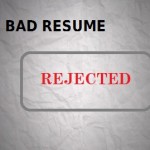Before you start sending out your resume, use this checklist below to make sure that your resume does not suck. Since the primary purpose of a resume is to successfully SCREEN OUT candidates, if your resume sucks, you won’t get to interview.

- Does your document provide lengthy information including all your work experience and personal details, even if this information is not relevant to the position you are applying for?
- Is your resume focussed on providing detailed job descriptions, outlining all duties and responsibilities, without any focus on achievements and contributions you made to various organisations?
- Does it list all work experience, going back to the year dot?
- Does it use a general objective statement, such as “To obtain a job that will provide me with opportunities for advancement in a progressive organisation”?
- Does it contain the contact details of personal referees? (Note: This question not applicable if you are a recent school leaver).
- Does it list personality attributes, such as “good communication skills”, without providing evidence of these attributes within your resume?
- Does it include irrelevant personal details such as date of birth, marital status, interests and hobbies?
- Does it include an explanation as to why you left the position, or reasons for gaps in the employment history?
- Does it contain spelling mistakes, typos and punctuation mistakes?
- Have you used a template from a major job board site such as SEEK or an MS Word template?
- Have you included your photograph (unless applying for a job which requires a photograph, such as an air hostess or modelling agency?
If you answered yes to more than one of the questions above, your resume might be letting you down as it is outdated.
The modern resume is a market-driven job search communication. That is, you need a resume that tells the buyer (employer), these critical facts:
- Why you are the perfect match for the job
- The skills and value you bring to the organisation
- Why you are worth the salary they are providing
- Your capacity to do the work better than other candidates
- Your ability to solve the employer’s problems
Without these key components you won’t be able to convince an employer that you are the perfect fit for the job.
 Get exclusive content when you subscribe to Boost Your Career
Get exclusive content when you subscribe to Boost Your Career Carolyn Smith BA, LLB, PLSC, CARW, CEIC, CERW
Carolyn Smith BA, LLB, PLSC, CARW, CEIC, CERW
Leave a Reply